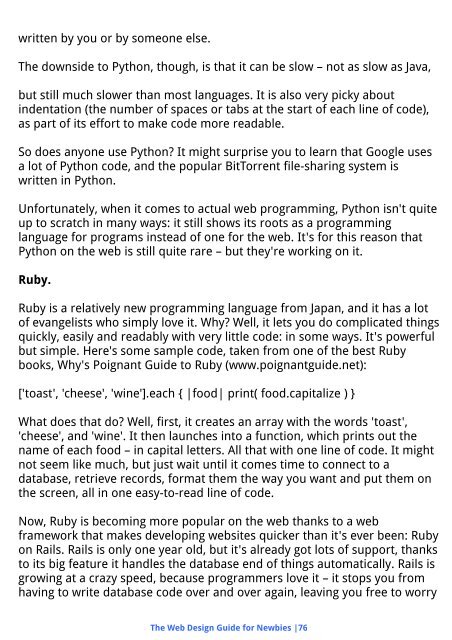You also want an ePaper? Increase the reach of your titles
YUMPU automatically turns print PDFs into web optimized ePapers that Google loves.
written by you or by someone else.<br />
The downside to Python, though, is that it can be slow – not as slow as Java,<br />
but still much slower than most languages. It is also very picky about<br />
indentation (the number of spaces or tabs at the start of each line of code),<br />
as part of its effort to make code more readable.<br />
So does anyone use Python? It might surprise you to learn that Google uses<br />
a lot of Python code, and the popular BitTorrent file-sharing system is<br />
written in Python.<br />
Unfortunately, when it comes to actual web programming, Python isn't quite<br />
up to scratch in many ways: it still shows its roots as a programming<br />
language for programs instead of one for the web. It's for this reason that<br />
Python on the web is still quite rare – but they're working on it.<br />
Ruby.<br />
Ruby is a relatively new programming language from Japan, and it has a lot<br />
of evangelists who simply love it. Why? Well, it lets you do complicated things<br />
quickly, easily and readably with very little code: in some ways. It's powerful<br />
but simple. Here's some sample code, taken from one of the best Ruby<br />
books, Why's Poignant Guide to Ruby (www.poignantguide.net):<br />
['toast', 'cheese', 'wine'].each { |food| print( food.capitalize ) }<br />
What does that do? Well, first, it creates an array with the words 'toast',<br />
'cheese', and 'wine'. It then launches into a function, which prints out the<br />
name of each food – in capital letters. All that with one line of code. It might<br />
not seem like much, but just wait until it comes time to connect to a<br />
database, retrieve records, format them the way you want and put them on<br />
the screen, all in one easy-to-read line of code.<br />
Now, Ruby is becoming more popular on the web thanks to a web<br />
framework that makes developing websites quicker than it's ever been: Ruby<br />
on Rails. Rails is only one year old, but it's already got lots of support, thanks<br />
to its big feature it handles the database end of things automatically. Rails is<br />
growing at a crazy speed, because programmers love it – it stops you from<br />
having to write database code over and over again, leaving you free to worry<br />
The Web Design Guide for Newbies |76


